
(Last update: September 2023)
Welcome to the University Library! This guide covers information on the library geared towards your doctoral studies.
If you have any questions, don’t hesitate to come to our information desks, where our staff will be happy to help you! You can also contact us by phone or email, which you can find in the library directory.
Video presentation on the library:
If you have any questions, don’t hesitate to come to our information desks, where our staff will be happy to help you! You can also contact us by phone or email, which you can find in the library directory.
Video presentation on the library:
As a UVigo student, you have at your disposal all of the spaces and services of eleven libraries across the three campuses. You can find your faculty’s library in the library directory or on Google Maps:
Opening hours: Monday to Friday, 8:30 to 20:45. Consult special opening hours for exam periods on the library website.
- Vigo Campus Libraries

- Torrecedeira Library

- Ourense Campus Central Library

- Pontevedra Campus Central Library

Opening hours: Monday to Friday, 8:30 to 20:45. Consult special opening hours for exam periods on the library website.
The library website contains information on the library’s opening hours, services and more, and grants access to the Perseo search engine and online resources.
Link: https://www.uvigo.gal/universidade/biblioteca
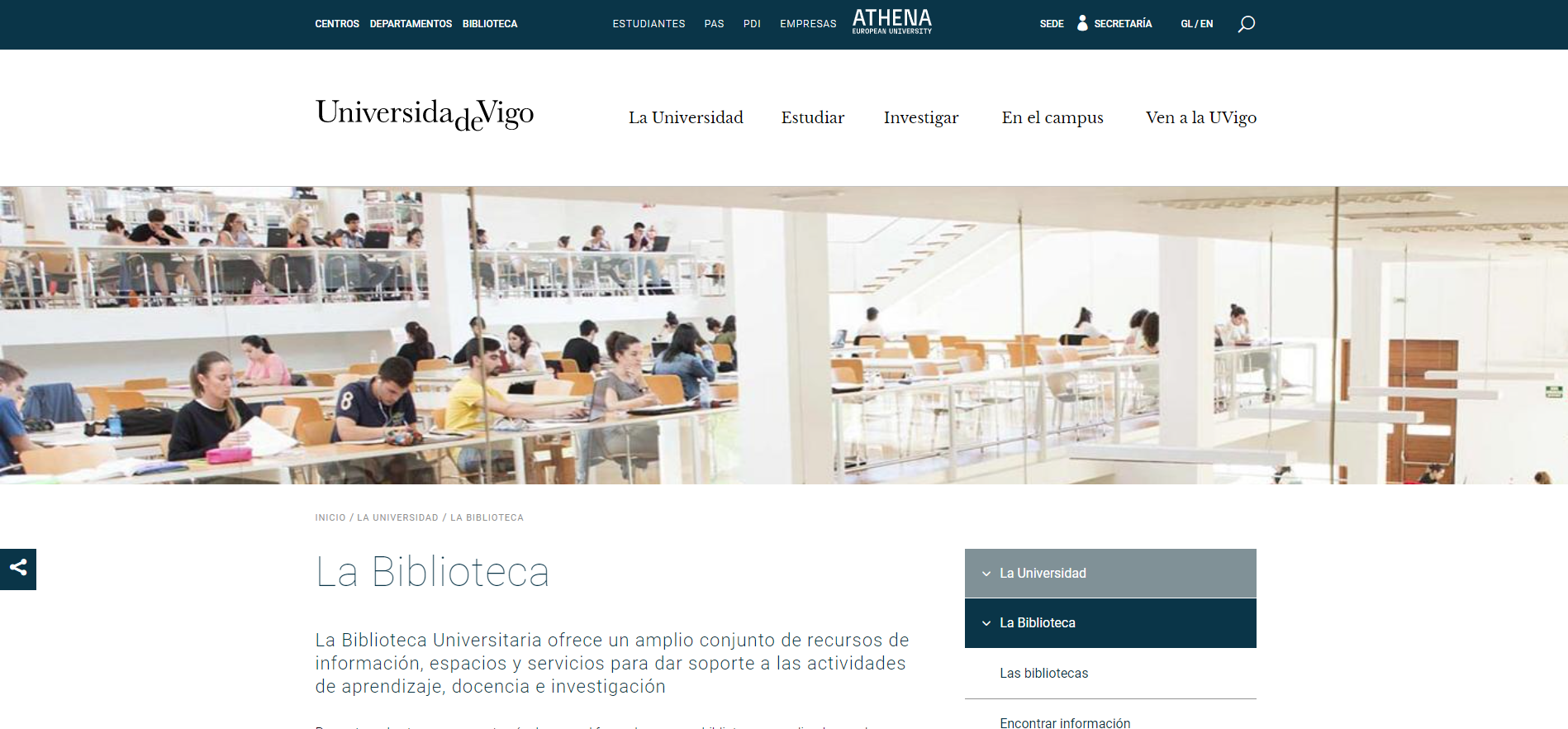
Link: https://www.uvigo.gal/universidade/biblioteca

1. A University ID card.
Your student ID card (TUI) grants access to all of the UVigo's libraries and lets you borrow documents, request group study rooms and computer rooms, and more.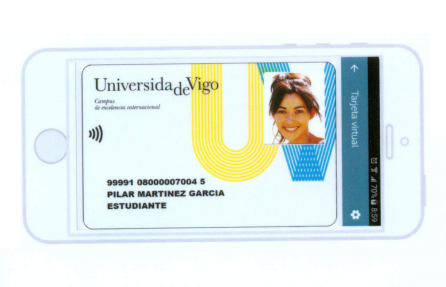 2. A University email account.
2. A University email account.
This automatically generated account must be activated by following these instructions. With it, you can:
Your student ID card (TUI) grants access to all of the UVigo's libraries and lets you borrow documents, request group study rooms and computer rooms, and more.
- You can order it through this link on the UVigo website. Follow the link in order to get more information about
the University card (TUI) and about how to obtain it. - Once obtained, you can access it with the UVigo App on your smartphone.

This automatically generated account must be activated by following these instructions. With it, you can:
- Access the Alumnos and Eduroam WiFi networks. The latter is recommended if you want a secure connection available in many universities around the world. For more information, visit “Connect to the campus networks”.
- Access online resources from outside the university by using the UVigo’s proxy or a SIR connection.
- Log in to the Perseo search engine.
While connected to the university’s network, you can directly access the online resources—databases, online journals, e-books, and more—that the library has subscribed to. If you want to access them from outside the university, use either of the following methods:
1. A proxy connection
2. A connection through SIR (RedIRIS Identity Service)
1. A proxy connection
2. A connection through SIR (RedIRIS Identity Service)
- Proxy: Using the proxy requires a small change to your browser’s settings, which you can find in the instructions on how to “Connect via a proxy”.
- SIR: As an alternative to the proxy, many resources can be accessed through SIR (RedIRIS’s identity service), a simple and secure connection method that does not require you to change your browser’s settings. Follow the instructions on the “SIR Guide”.
The library grants access to a selection of information resources and support materials that are suited to your discipline and to the unfolding of your professional and research activities.
Video: Electronic resources. Duration: 2:09 min. (University Library of Vigo)
- The physical collections of the 11 libraries across the three UVigo campuses are at your disposal. You can request the loaning of a document from any library by using your student ID card (TUI) and return them to whichever you choose. For more information, check “How the book loan system works”.
- You also have an ample selection of online resources available to you. These range from specialised, multidisciplinary databases, e-journal and e-book portals, policy databases , and more.
Video: Electronic resources. Duration: 2:09 min. (University Library of Vigo)
Perseo is the university library’s main search engine.
You can use Perseo to find printed and online documents—books, journals, articles, book chapters, and more—whether they be open access or subscribed to by the UVigo. It also allows you to retrieve content from Investigo, the institutional repository.
Link: https://perseo.uvigo.gal/
You can find further information on Perseo in the Perseo Guide
The following videos provide information on how to authenticate on Perseo and how to perform simple and advanced searches on the search engine.
How to authenticate in Perseo:
Video: "Advantages of logging in to Perseo". Duration 2:18 min. (University Library of Vigo)
The simple search in Perseo:
Video: "Perseo's basic search". Duration: 2:17 min. (University Library of Vigo)
The advanced search in Perseo:
Video: "Perseo's advanced search". Duration: 4 min. (University Library of Vigo)
You can use Perseo to find printed and online documents—books, journals, articles, book chapters, and more—whether they be open access or subscribed to by the UVigo. It also allows you to retrieve content from Investigo, the institutional repository.
Link: https://perseo.uvigo.gal/
You can find further information on Perseo in the Perseo Guide
The following videos provide information on how to authenticate on Perseo and how to perform simple and advanced searches on the search engine.
How to authenticate in Perseo:
Video: "Advantages of logging in to Perseo". Duration 2:18 min. (University Library of Vigo)
The simple search in Perseo:
Video: "Perseo's basic search". Duration: 2:17 min. (University Library of Vigo)
The advanced search in Perseo:
Video: "Perseo's advanced search". Duration: 4 min. (University Library of Vigo)
Supplementary courses
We offer courses and workshops to improve your skills in accessing, managing, assessing our information resources . Among these is the course on “Accessing, selecting, evaluating and publishing scientific information", which is geared towards doctoral students.
We also offer sessions prepared by our information resource providers to present and improve their latest products. Check the “training schedule” for more information.
Counselling
You can ask us for advice on any issue regarding the search for and management of information, such as:
We offer courses and workshops to improve your skills in accessing, managing, assessing our information resources . Among these is the course on “Accessing, selecting, evaluating and publishing scientific information", which is geared towards doctoral students.
We also offer sessions prepared by our information resource providers to present and improve their latest products. Check the “training schedule” for more information.
Counselling
You can ask us for advice on any issue regarding the search for and management of information, such as:
- Searching for specialised bibliographic information.
- The advanced use of information resources (databases, academic search engines , etc.)
- Managing bibliographic references and creating bibliographic citations.
- Intellectual property rights and open access.
The library team offers a series of specialised guides containing a selection of recommended content in different formats to help you search for information, in addition to other guides and tutorials .
There are 4 types of guides:
There are 4 types of guides:
- Subject guides: a selection of information resources for various subjects.
- Research support: guides concerning the quality of publications, open access, the evaluation of scientific output, and other related topics.
- Citing and managing bibliographies: guides on citation styles, plagiarism, reference management software, and more.
- Other guides: miscellaneous guides (how to loan books, the Perseo search engine, e-book platforms, etc.)
The University of Vigo staunchly supports the Open Access movement within the domain of scientific literature, and the Open Science movement through Investigo—our institutional repository—and through agreements with various publishers to publish openly.
Investigo, the institutional repository
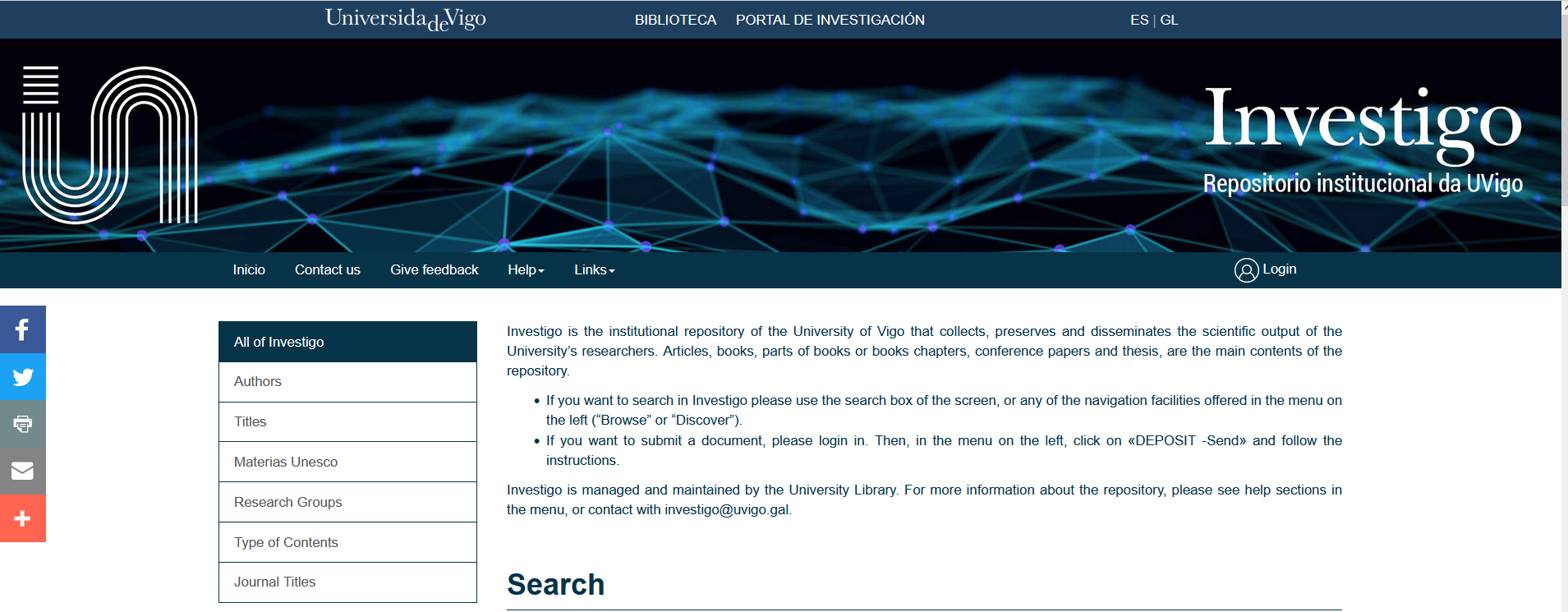
Investigo, the University of Vigo’s institutional repository collects, distributes and safeguards the scientific output of its research staff, and consists of articles, books, chapters or parts of books, contributions to conferences and doctoral dissertations that were defended at the university.
Open access publishing agreements
The University Library’s agreements with several academic publishers allow it to openly publish (Open Access) articles with funding or at a discounted publication fee . You can consult the agreements in the University Library’s guides.
Investigo, the institutional repository

Investigo, the University of Vigo’s institutional repository collects, distributes and safeguards the scientific output of its research staff, and consists of articles, books, chapters or parts of books, contributions to conferences and doctoral dissertations that were defended at the university.
Open access publishing agreements
The University Library’s agreements with several academic publishers allow it to openly publish (Open Access) articles with funding or at a discounted publication fee . You can consult the agreements in the University Library’s guides.
The Interlibrary Loan and Document Access Services—which are free for doctoral students—allow members of the university community and other authorised persons to procure books and documents not found within our collections. You can use it even from outside the university as long as you are enrolled in the University of Vigo’s doctoral programmes.
Bibliometric services area
Our Bibliometric Services Area analyses the scientific output of the University of Vigo’s members by conducting studies and compiling bibliometric reports. It also advises research staff on matters of publishing and scientific dissemination.
Research Portal
The UVigo’s Research Portal—managed by the Vicerectory of Research and the University Library—aims to gather, disseminate, promote and transfer the scientific output generated by the university’s teaching and research staff to society. Use the research portal to find the research staff and groups from your subject area, as well as to discover lines of research and the university’s individual and collective scientific output.
Our Bibliometric Services Area analyses the scientific output of the University of Vigo’s members by conducting studies and compiling bibliometric reports. It also advises research staff on matters of publishing and scientific dissemination.
Research Portal
The UVigo’s Research Portal—managed by the Vicerectory of Research and the University Library—aims to gather, disseminate, promote and transfer the scientific output generated by the university’s teaching and research staff to society. Use the research portal to find the research staff and groups from your subject area, as well as to discover lines of research and the university’s individual and collective scientific output.

Vigo Campus Central Library
Soporte Aprendizaxe e Investigación
Tel: (+34) 986.813.843

Pontevedra Campus Central Library
Soporte Aprendizaxe e Investigación
Tel: (+34) 986.802.001 / 986.801.996

Ourense Campus Central Library
Soporte Aprendizaxe e Investigación
Tel: (+34) 988.387.230 / 988.387.158
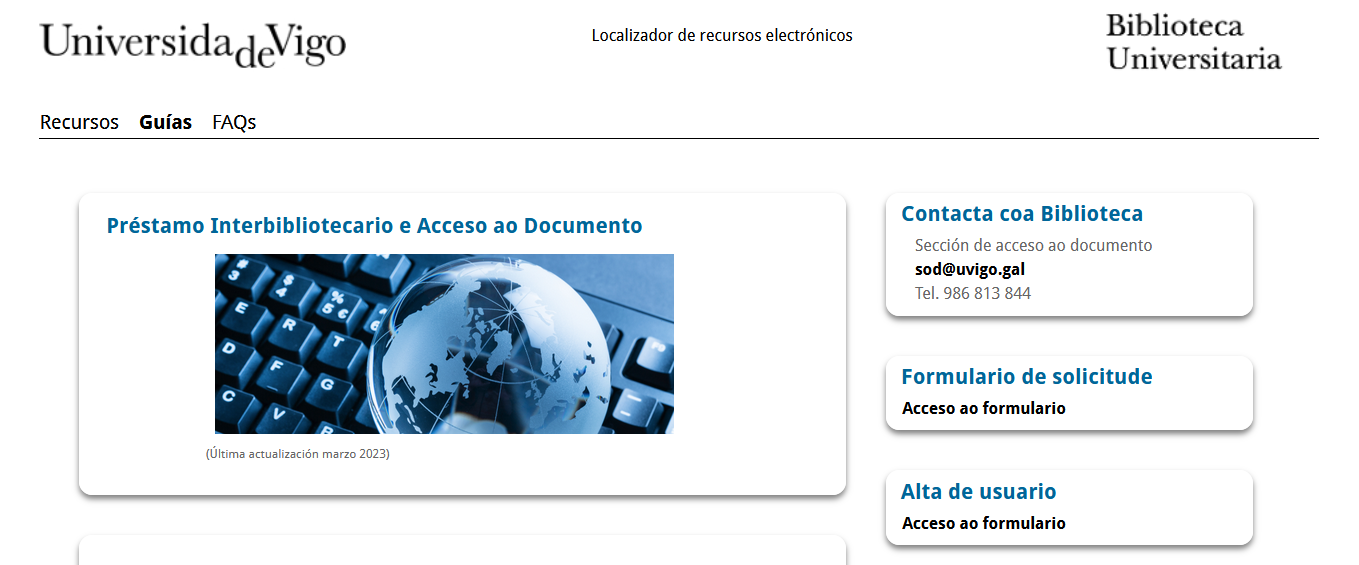
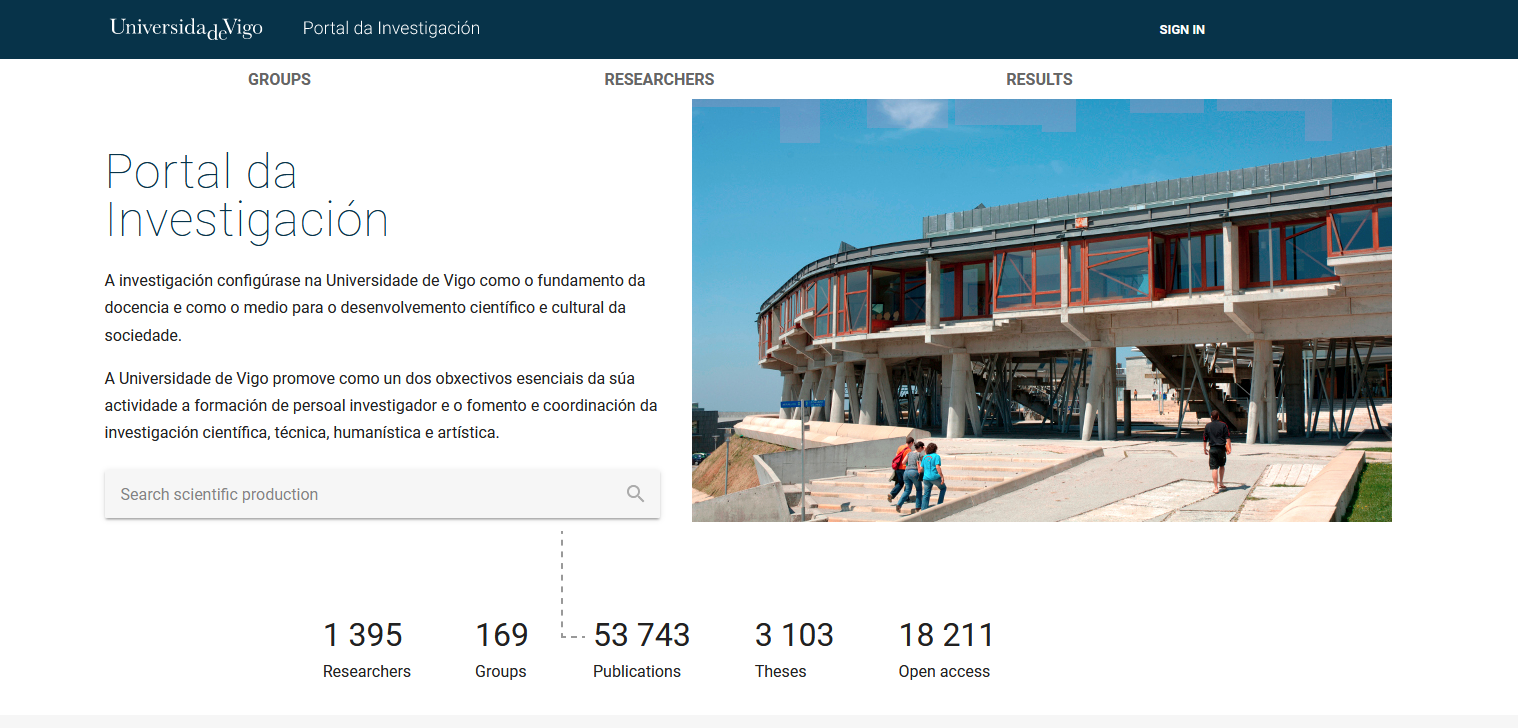
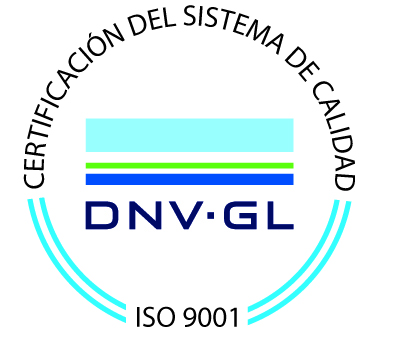 Tlf: +34 986 813 853
Tlf: +34 986 813 853